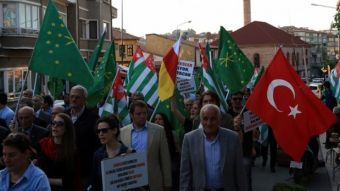
Circassian Repatriates From Turkey Call for Resumed Russian-Turkish Cooperation
Publication: Eurasia Daily Monitor Volume: 13 Issue: 42
By:

With Russian-Turkish tensions spiraling downward, many Circassian immigrants of Turkish origin in the North Caucasus have renounced their Turkish citizenship in favor of Russian citizenship. Circassian immigrants from Turkey in Kabardino-Balkaria signed a statement calling on the Turkish authorities to resume cooperation with Russia. Reciting official Russian propaganda, the statement declares: “We believe that Turkey, guided by the principles of fairness and justice, taking into account its own national interests, must recognize the mistake of the Turkish Air Force, when it decided to attack a military aircraft of the Russian Federation, which has had such tragic consequences. The authorities in Turkey should apologize for downing the aircraft of the Russian Air Force. Those responsible for the incident should be punished. Finally, Turkey should compensate for the damage caused to Russia, including members of the military families, whose children have been orphaned, and their wives and mothers” (Kavkazskaya Politika, February 24).
Russian-Turkish relations broke down after a Russian military jet in Syria allegedly flew into Turkish airspace and was shot down by the Turkish Air Force on November 24, 2015. President Vladimir Putin vowed to punish the Turkish authorities, and Moscow imposed economic sanctions on Turkish goods, services, and citizens in December 2015. The Turkish authorities showed no remorse for downing the Russian plane, claiming the Russian military aircraft had repeatedly ignored their warnings. The souring of relations between Turkey and Russia had a significant negative effect on Circassians because of the traditional ties between the North Caucasian Circassians and the Turkish Circassians. Following the Russia’s brutal conquest of the Circassian territory in the North Caucasus in the 19th century, the Russian tsar expelled the majority of the Circassian population of the region to the Ottoman Empire and quickly repopulated the Circassian land with Russian settlers. Hence, there are currently several times more Circassians in Turkey than in their homeland in the North Caucasus.
After the end of the Cold War, many Circassians from Turkey tried to return to their historical homeland and some succeeded despite the rigid Russian visa and naturalization requirements. Some of the Circassian repatriates from Turkey in the North Caucasus who had only provisional permission to stay in the region immediately received government notices after the Russian plane was downed in Turkey. According to one of the repatriates, Setin Sokurov, the authorities started annulling residence permits for the Circassians “en masse.” Some repatriates are afraid that they might be forced to leave their homeland once again, as the government is preparing court appeals. Hence, an estimated 150 Circassian-Turkish families decided to address the leadership of Turkey and Russia, calling on them to cooperate. Circassian repatriates from Turkey sided with Russia in their appeal, which created a split within the Circassian community across state borders. Turkish Circassians support their government, and the North Caucasian Circassians appear to support their government in the Russian-Turkish tensions. In January 2016, the Federal Migration Service (FMS) annulled the residence permits of seven Circassian repatriates, accusing them of breaking migration laws. In December 2015, the Federal Security Service (FSB) put a Circassian repatriate in Adygea, Adnan Khuade, along with his daughter and his assistant, under arrest. Government pressure on the Circassian repatriates sparked a substantial outcry among the Circassian activists, including those who cooperate with the authorities quite closely, such as Asker Sokht in Krasnodar region. Sokht said that the Russian sanctions against Turkey disrupted the lives of many Circassian repatriate families. Rights activist Valery Khatazhukov appealed to the Kabardino-Balkarian government to prevent the deportation of Circassian repatriates (Kavkazsky Uzel, February 3).
Despite Russian-Turkish tensions, the airlines that fly from the North Caucasus to Turkey resumed service after a month-long gap. As part of its retribution for the shooting down of its warplane, the Russian government unilaterally suspended the visa-free regime for Turkish citizens starting on January 1, 2016. Turkey’s Onur Air had to stop its flights to Nalchik, Kabardino-Balkaria, because its crews could not receive Russian visas on time. It was unclear for how long the suspension would last. Yet, on February 2, Onur Air announced that it was resuming flights to Nalchik and the first flight flew on February 8. Currently, the company’s Airbus A-320 flies twice a week to Nalchik from Istanbul, and the frequency of flights is set to increase to three times per week (Kavkazsky Uzel, February 8).
Given the continuing tensions between Russia and Turkey over Syria, it is unlikely that the two countries will return to “business as usual” anytime soon. For the Circassians, it means that they will have to avoid being trapped in the patriotic frenzy if they want to avoid harming their cooperation across borders. If Moscow plans on a long-term period of worsening relations with Turkey, it is likely to use the situation as a pretext for cracking down on the Circassian movement and limiting its cooperation across borders even more. The resumption of Turkish airline flights to the North Caucasus might mean that Moscow is considering softening its stance on its differences with Turkey under certain scenarios.




